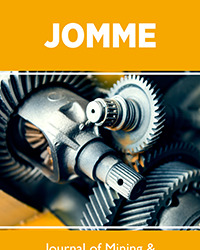#https://lupinepublishers.com/mining-mechanical-engineerning/archive.php
Explore tagged Tumblr posts
Text
lupine publishers| Prediction of Brinell Hardness Number; A TIG Process Parameter Needed to Eliminate Post Weld Crack Formation and Stabilize Heat Input in Mild Steel Weldment Using Fuzzy Logic (FL)Research Article

The Brinell hardness number (BHN) is the load divided by the surface area of indentation. The diameter of the impression is measured with a microscope with a superimposed scale. BHN remains vital parameters for the assessment of weld quality and also to eliminate post weld crack formation. The focus of this study is to predict tig process parameter such as Brinell hardness number (BHN) for eliminating post weld crack formation, and stabilizing heat input in mild steel weldment. The key input parameters considered in this work are welding current, welding voltage and welding speed while the response or measured parameter is Brinell hardness number (BHN). Using the range and levels of the independent variables, statistical design of experiment (DOE) using central composite design (CCD) method was done. Hundred (100) pieces of mild steel coupons measuring 60 x 40 x10 were used for the experiments. The experiment was performed 20 times, using 5 specimens for each run. The plate samples were 60 mm long with a wall thickness of 10mm. The samples were cut longitudinally with a Single-V joint preparation. The tungsten inert gas welding equipment was used to weld the plates after the edges have been bevelled and machined. The welding process uses a shielding gas to protect the weld specimen from atmospheric interaction. For this study, 100% pure Argon gas was used. The weld samples were made from 10mm thickness of mild steel plate; the plate was cut to size with the power hacksaw. The edges grinded and surfaces polished with emery paper and the joints welded and thereafter, the response (Brinell hardness number) was measured, recorded, and analysed using fuzzy logic.
153Copyright © All rights are reserved by Obahiagbon K.Journal of Mining and Mechanical EngineeringResearch ArticlePrediction of Brinell Hardness Number; A TIG Process Parameter Needed to Eliminate Post Weld Crack Formation and Stabilize Heat Input in Mild Steel Weldment Using Fuzzy Logic (FL)Pondi P1, Achebo J2 and Obahiagbon K3*1Department of Production Engineering, University of Benin, Nigeria2Department of Production Engineering, University of Benin, Nigeria3Department of Chemical Engineering, University of Benin, Nigeria*Corresponding author:Obahiagbon K, Department of Chemical Engineering, Faculty of Engineering, University of Benin, P.M.B 1154, Benin City, Edo State, NigeriaReceived:March 26, 2021 Published:April 22, 2021Introduction Most of the structural failures happening today is because of poor weld strength Palani et.al. [1] These welding failures are mostly influenced by improper combination of the welding process factors Marseguerra et al. [2] The quality and strength of a weld is characterized by the reduction and elimination of weld defects such as cracks, undercut, deformation, porosity [3] in addition to controlling the heat input which is a very strong determining factor needed to produce a reliable weld Shubhavardhan et. al. [4] One of the fundamental issues facing Engineers in the manufacturing sector is the problem of choosing the most suitable combinations of input process parameters to achieve the required optimum weld bead quality Springer et.al. [5] It is a well-known fact that most welders mainly focused on [6] bead geometry and aesthetics of the weld structure, but the reduction in post weld cracks which determines the overall quality of weldment has not been paid much attention Navid et.al.[7] These problems can be solved with
For more information###
#https://lupinepublishers.com/mining-mechanical-engineerning/archive.php#https://lupinepublishers.com/mining-mechanical-engineerning/#Lupine publishers#mechanical engineering#central composite design
5 notes
·
View notes